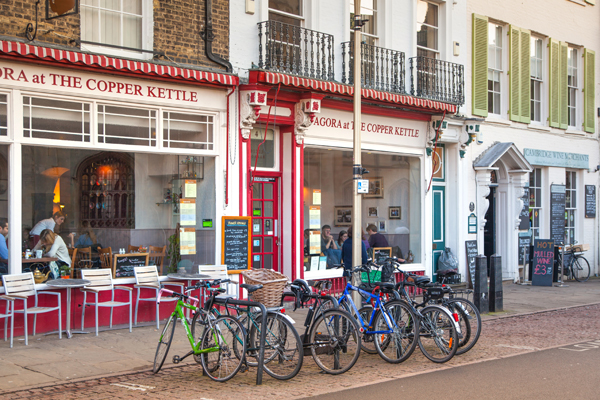Cost of Living in Abingdon
Summary: If you're moving to Abingdon, understanding the the cost of living in Abingdon helps you know what to expect when it comes to apartment or house hunting, grocery shopping, transportation, dining out, utilities and more.

| Cost of Living | Abingdon |
| Apartment Rentals | The average cost of renting a one-bedroom apartment in Abingdon is £735 per month. A two-bedroom apartment costs around £890 per month. A three-bedroom apartment costs around £1,100 per month. |
| Apartment Purchases | The average cost of purchasing a one-bedroom apartment in Abingdon is £150,000. A two-bedroom apartment costs around £200,000. A three-bedroom apartment costs around £250,000. |
| Transportation | The cost of public transportation in Abingdon is £2.20 for a single journey. A monthly bus pass costs £50. A monthly train pass costs £90. |
| Groceries | The average cost of groceries in Abingdon is £50 per week for a family of four. This includes basic items such as milk, bread, eggs, and vegetables. |
| Restaurants | The average cost of a meal at a mid-range restaurant in Abingdon is £15 per person. A three-course meal for two people at a mid-range restaurant costs around £50. |
| Utilities | The average cost of utilities in Abingdon is £150 per month for a family of four. This includes electricity, gas, water, and internet. |
| Private School Tuition | The average cost of private school tuition for preschool in Abingdon is £2,500 per year. The average cost of private school tuition for elementary school is £4,000 per year. The average cost of private school tuition for middle school is £5,000 per year. The average cost of private school tuition for high school is £6,000 per year. |
Monthly Budget for Retirees in Abingdon
"The cost of living in Abingdon is generally considered to be quite reasonable. The average rent for a one-bedroom apartment in the city centre is around £700 per month, while outside of the city centre it can be as low as £500 per month. Groceries and other everyday items are also relatively affordable, with the average cost of a meal for two at a mid-range restaurant being around £30. Public transport is also reasonably priced, with a single bus ticket costing around £2.50," said one expat living in Abingdon.
Can I live in Abingdon on $1,500 a month?
"I've been living in Abingdon for a while now, and I can tell you that it's possible to live on $1,500 a month, but you'll have to make some sacrifices. First, you'll need to find a place to live that's within your budget. I'd recommend looking for a flatshare or a small studio apartment in the more affordable neighborhoods like South Abingdon or Peachcroft. These areas are still close to the town center and have good access to public transport, but the rent is generally lower than in the more expensive neighborhoods like Northcourt or Radley.Next, you'll need to be mindful of your spending on groceries and eating out. Shopping at discount supermarkets like Aldi or Lidl can help you save on groceries, and cooking at home as much as possible will also help keep your costs down. When you do eat out, look for cheaper options like cafes, pubs, or takeaway places instead of more expensive restaurants.Transportation can also be a significant expense, so consider using public transport, cycling, or walking instead of driving a car. Abingdon is well-connected by bus to nearby cities like Oxford, and there are plenty of cycle paths and pedestrian-friendly areas to help you get around.As for entertainment and leisure activities, you'll need to be selective about what you spend your money on. There are plenty of free or low-cost activities in Abingdon, like visiting the Abbey Gardens, walking along the River Thames, or attending community events. However, you might need to cut back on more expensive hobbies or outings, like going to the cinema or attending concerts.In summary, living comfortably on $1,500 a month in Abingdon is possible, but you'll need to be mindful of your spending and make some sacrifices. By choosing an affordable neighborhood, being careful with your grocery and dining expenses, and finding low-cost or free activities, you can make it work," commented an expat living in Abingdon.
Can I live in Abingdon on $3,500 a month?
"I've been living in Abingdon for a few years now, and I can tell you that it's definitely possible to live comfortably on $3,000 a month, but you'll have to make some sacrifices. First, you'll need to find a more affordable neighborhood to live in. I'd recommend looking at areas like Peachcroft, which is a bit further from the town center but has more reasonably priced housing options. You might also want to consider sharing a flat with someone to cut down on rent costs.As for other expenses, you'll need to be mindful of your spending on things like groceries, transportation, and entertainment. Shopping at discount supermarkets like Aldi or Lidl can help you save on groceries, and you can also save money by cooking at home more often instead of eating out. For transportation, consider using public transport or cycling instead of owning a car, as parking and petrol can be quite expensive in Abingdon.When it comes to entertainment, there are plenty of free or low-cost activities to enjoy in the area, like walking along the Thames Path or visiting the Abbey Gardens. However, you might have to cut back on more expensive hobbies or nights out to make your budget work.In terms of neighborhoods to avoid, the town center and areas like Radley and Northcourt can be quite pricey, so you might want to steer clear of those if you're trying to stick to a $3,000 a month budget.Overall, it's definitely doable to live comfortably in Abingdon on that budget, but you'll need to be mindful of your spending and make some sacrifices in terms of housing and lifestyle choices," said one expat living in Abingdon.
Can I live in Abingdon on $5,000 a month?
"I've been living in Abingdon for a few years now, and I can tell you that it's definitely possible to live comfortably on $5,000 a month, even if you're used to modern amenities. However, you might have to make a few sacrifices to make it work. For example, you might not be able to afford a large, luxurious house in the most expensive neighborhoods, but you can still find a nice, comfortable place to live in more affordable areas.In terms of neighborhoods, I would recommend looking into areas like Northcourt, Peachcroft, or South Abingdon. These areas are more affordable and still offer a good quality of life. You can find a decent-sized house or flat for around £1,000 to £1,500 per month, which should leave you with plenty of money for other expenses.On the other hand, I would avoid neighborhoods like Radley or the town center, as these areas tend to be more expensive. Renting a house or flat in these areas could easily cost you £2,000 or more per month, which might not leave you with enough money for other necessities.In terms of other expenses, you'll find that groceries, utilities, and transportation costs are relatively reasonable in Abingdon. You can save money by shopping at discount supermarkets like Aldi or Lidl, and by using public transportation or cycling instead of driving everywhere.One sacrifice you might have to make is cutting back on eating out or going to expensive bars and clubs. While there are plenty of great restaurants and pubs in Abingdon, frequenting them can quickly eat into your budget. Instead, consider cooking at home more often and exploring the local parks and countryside for free entertainment.Overall, living in Abingdon on $5,000 a month is definitely doable, but you'll need to be mindful of your spending and make a few sacrifices to ensure you can maintain a comfortable lifestyle," commented an expat living in Abingdon.
About the Author
 Betsy Burlingame is the Founder and President of Expat Exchange and is one of the Founders of Digital Nomad Exchange. She launched Expat Exchange in 1997 as her Master's thesis project at NYU. Prior to Expat Exchange, Betsy worked at AT&T in International
and Mass Market Marketing. She graduated from Ohio Wesleyan University
with a BA in International Business and German.
Betsy Burlingame is the Founder and President of Expat Exchange and is one of the Founders of Digital Nomad Exchange. She launched Expat Exchange in 1997 as her Master's thesis project at NYU. Prior to Expat Exchange, Betsy worked at AT&T in International
and Mass Market Marketing. She graduated from Ohio Wesleyan University
with a BA in International Business and German.
Some of Betsy's articles include 12 Best Places to Live in Portugal, 7 Best Places to Live in Panama and 12 Things to Know Before Moving to the Dominican Republic. Betsy loves to travel and spend time with her family. Connect with Betsy on LinkedIn.




